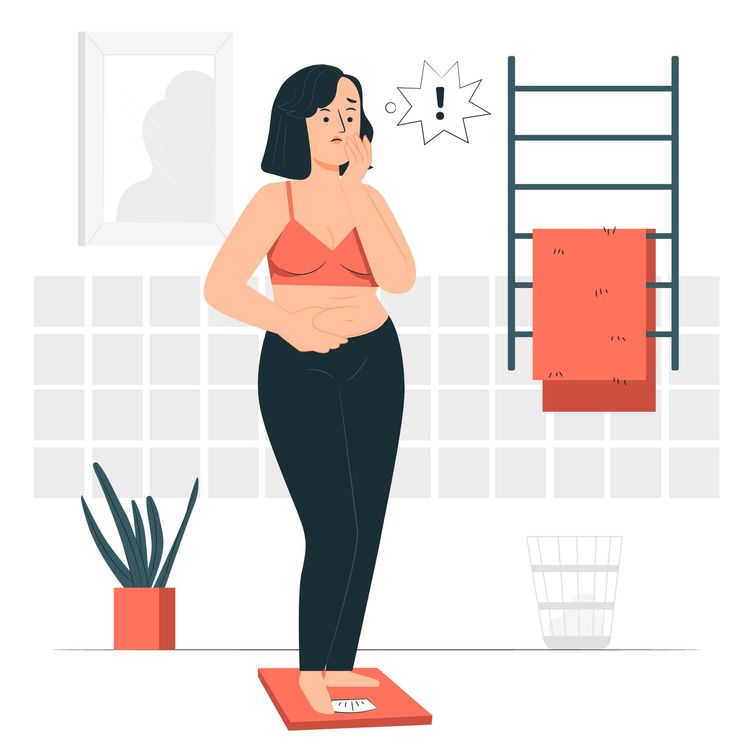Has chronic dieting done you more harm than good?

When a client tells me that they want to lose weight, I'll make a point to ask them, "When was the last time you were on a diet?"
More often than not, they respond, "When have I not been on a diet? It's like a never-ending cycle. I lose weight, then gain it back, then lose it again, then gain it again. I feel like I've been on this rollercoaster nonstop since high school."
Sound familiar? This is a super common experience, especially if you're a busy, ambitious professional who is grappling with lofty goals and a high-stress lifestyle. After a demanding month at work and at home, you may suddenly find that your clothes don't fit the way they used to. You may feel guilt when you look in the mirror and realize that you've put on weight. From there, it's natural to resort to starting a diet to get back on track or regain a sense of accomplishment.
But if you're falling into the cycle of dieting over and over again, it can wreak havoc on your body in ways that people rarely talk about.

The pitfalls of long-term caloric restriction
All our lives, we've been pummeled with messages that tell us that eating less, moving more, and being smaller makes us healthier and more desirable as human beings. What you see on social media and online ads is one thing, but when your family, friends, and doctors tell you the same, it's hard not to internalize the notion that it's good to always be dieting.
But wait a minute, aren't they objectively right? Having love handles can't possibly be good for your health, right?
While I can't deny that carrying extra fat is a health risk, we need to acknowledge that being in a diet for an extended period of time is also a health risk. In moderation, diets can absolutely improve physical and mental health. But when taken too far, the negative side effects of dieting can overwhelm the benefits. Here are some of the costs you incur when the diet goes on for too long.
Metabolic slowdown
We're all familiar that weight loss works when you eat less calories than you expend, forcing your body to burn body fat as fuel instead. However, over time, your body realizes that it's not getting enough food and starts finding creative ways to conserve energy. It gets more efficient at vital functions such as breathing and circulating blood, and may reduce involuntary movements like twitching and blinking.
This means that you need less calories to function, so you need to eat even less to continue losing weight. Essentially, your metabolism becomes slower, which makes weight regain almost inevitable if you return to eating the way you did before dieting.

Hormonal imbalances
Another way your body's survival response kicks in is by tweaking your hormones. Leptin is the hormone that gives you the feeling of fullness and ghrelin is the hormone that gives you the feeling of hunger. Long term dieting has been shown to decrease your leptin levels and increase your ghrelin levels, leading you to feel hungry all the time.
This is meant to be a protective mechanism to tell you to eat, so that you don't starve. However, when we come off of a long diet, your hormones will overcompensate, leading to cravings for high calorie foods and overeating once the diet ends.
Nutritional deficiencies
Regardless of how much you intentionally incorporate fresh fruits and vegetables, lean proteins, and healthy fats, under-eating for long periods of time almost always means nutritional deficiencies. By definition, your body isn't getting enough energy for normal functioning, and it's probably also lacking vitamins, minerals, and/or electrolytes as well. These deficiencies will eventually lead to a weakened immune system, brittle hair and bones, and other chronic health problems.

Muscle and bone loss
The longer you've been in a caloric deficit, the more likely you are to shed precious muscle mass rather than fat. Chronic caloric restriction, particularly without sufficient protein intake and exercise, can result in a smaller, but weaker body. Additionally, prolonged deficits can compromise your bone density, making you susceptible to fractures in the future.

The psychological toll
Physical health aside, studies have shown that prolonged dieting leads to depression, emotional distress, and irritability. Dieting requires that you pay close attention to what you eat and what you weigh, and this fixation on food and body can unfortunately take a turn for the worse.
While you may have started your diet with the hope of gaining confidence in your body, constantly evaluating your body can actually worsen body image and even encourage disordered eating patterns. Perhaps unsurprisingly, people who are obese are a lot more likely to develop eating disorders.
What should you do if you're a chronic dieter?
Now you may be discouraged by reading about all the negative consequences of dieting, but the good news is that there's a simple, reliable, and all-too-obvious fix – take an extended break from dieting.
I know this may sound difficult and counterintuitive, especially if you're dedicated to the goal of losing weight. However, the goal here isn't to give up on your weight loss ambitions but to prioritize recovery in the short term.

A break from dieting offers your metabolism a chance to reset. And this is not just fluffy self-care guru advice. It's been proven that periods of 'diet breaks' may improve weight loss efficiency by mitigating all the negative metabolic responses to caloric restriction that we mentioned earlier. Essentially, giving your body a rest allows it to feel secure and find its equilibrium again, setting you up for more responsive weight loss phase in the future.
It's easy to get wrapped up in the dieting mindset, especially when you're juggling work, family, and other commitments. But before you jump into yet another diet, really consider whether your body is in a good position for it. If you haven't already taken a break from dieting, are you willing to sacrifice your long-term health to continue?
To all the chronic dieters out there, you know who you are. Challenge yourself to change the script. Take a much-needed break from dieting and prioritize recovery. Your body—and your future self—will thank you.


